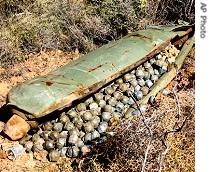2006年VOA标准英语-Cluster Bomb Treaty Comes Into Force
搜索关注在线英语听力室公众号:tingroom,领取免费英语资料大礼包。
(单词翻译)
By Lisa Schlein
Geneva
12 November 2006
 A Cluster Bomb Unit, dropped by Israeli warplanes, sits in southern village of Ouazaiyeh, Lebanon, November 9, 2006 |
||
-----
Cluster bombs, landmines and other unexploded weapons remain in the ground decades after a conflict has ended. They continue to kill and maim4 civilians5, indiscriminately, long after a conflict ends. They are also a continuing threat to farmers in former war zones, preventing many from cultivating their fields.
The treaty coming into force requires countries to clean up the unexploded bombs and landmines left over from previous wars. Most of these weapons are found in poor countries, such as Vietnam, Laos and Afghanistan, countries that can least afford the clean up.
Handicap International Victim Assistance Coordinator6 Katleen Maes says these weapons have been around for too long.
"The first cluster munitions were used in the Second World War. The first widespread use was in Vietnam, Laos, and Cambodia in the '60s and '70s," she said. "These cluster munitions still cause damage. Nevertheless, in 2006, cluster munitions have been used in Israel, Lebanon and in Iraq."
A recent study by Handicap International, finds civilians account for 98 percent of those killed and maimed by cluster bombs. It reports there are about 100,000 victims of these weapons worldwide, a third of them children.
Interest in these weapons was renewed during the one-month war in Lebanon this summer. The United Nations estimates Israel dropped about four million sub-munitions on Lebanon. In turn, Hezbollah shot thousands of rockets containing cluster bombs into Israel.
The U.N. Children's Fund says cluster bombs continue to take a heavy toll7 on children in Lebanon. Spokesman, Michael Bociurkiw, says five of the 16 people killed by unexploded weapons since the August 14 truce8 were children.
"We have become very concerned about children's safety, especially now because it is the harvest season," said Bociurkiw. "Families are going to the fields to harvest their olives and their agricultural produce. So, it is a very real physical threat to children in Lebanon and also it is a huge threat to the economic well being of families."
The issue of cluster bombs is on the agenda of an international arms control review conference in Geneva. U.N. Secretary General Kofi Annan has called for a freeze on the use of these weapons near populated areas.
In its study, Handicap International argues cluster bombs have no military value. The International Committee of the Red Cross and other humanitarian9 organizations are calling for a ban on their use. But, countries, such as the United States, Russia and China are opposed.
Handicap International says about four-billion cluster bombs are stockpiled in 33 producer countries. They include Russia, China, and the United States, which has a billion in stock.




